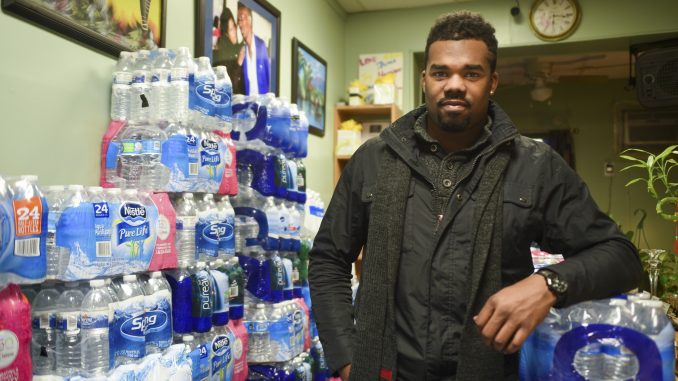
When he saw the state of the water crisis in Flint, Michigan, Rob Lawton said he felt like he was in a third world country.
“It turned my stomach,” he said. “Is this really America?”
Lawton, who graduated from the Fox School of Business in 2013 with a bachelor’s degree in marketing, observed the crisis firsthand when he traveled to Flint to aid in relief efforts.
The idea was brought to him by Nehemiah Davis, Lawton’s friend and founder of The Nehemiah Davis Foundation, a nonprofit community outreach organization. Only three days after Davis originally pitched the idea, Lawton, along with Temple alumna Melissa Robbins, made the trip to Flint with 60,000 water bottles to distribute to residents.
According to the Flint Water Study, for more than a year, residents of Flint have been unknowingly drinking and bathing in a water supply that contains toxic amounts of lead. Despite months of Flint residents complaining about tap water with strange colors and odors, government officials insisted that the water supply was safe for use, according to The New York Times.
Lawton said he and his team refused to stand by and wait for the problem to be solved.
“Our generation stands for doing more and talking less,” Lawton said.
In less than a week, he and his team had distributed more than 2,000 cases of water to residents of Flint.
While he was in Flint, Lawton said he noticed some people hadn’t yet received any form of assistance in response to the water crisis.
“People aren’t aware of the level of inaction that local and state government has taken,” Lawton said.
Lawton said some families that have a house full of kids and no car had no way to fire stations or government buildings, where water and filters were being distributed. He said he made a point to bring water to these neighborhoods specifically.
“We wanted to show the residents that people actually care about them,” Lawton said.
The group’s physical presence in the city left an impact on the group as a whole, showing them that they can “come together and do good things,” Lawton said.
Despite their efforts, Lawton said that pumping water bottles into the city is helpful in the short term, but creates another problem: massive waste generation.
“We’re treating the symptoms, not addressing the cause,” Lawton said. “We need advocates in power that can make something happen immediately.”
Lawton’s group documented their trip with a YouTube video titled #Philly2Flint. This hashtag sparked a movement in which groups traveling to Flint from other cities altered the hashtag to use their city’s name.
Greater Philadelphia is providing relief efforts to Flint in more ways than one. ZeroWater, a water filtration company based in Bucks County, initiated its “Filters for Flint” program.
The company’s water filters are the only pour-through filters certified by the National Science Foundation to meet the Environmental Protection Agency’s standards for lead removal, and the lifespan of the filters helps reduce the waste that the water bottle donations cause.
Marketing Executive Tony Petruzzi said ZeroWater felt “obligated to participate” in relief efforts. For every donation that’s made through the Filters for Flint program, ZeroWater is matching the donation.
“In two and a half weeks, we’ve shipped over $50,000 worth of product and donation matches,” said Petruzzi.
Before the program was even established, ZeroWater donated thousands of filtration units to schools in Flint in an effort to provide short-term relief.
“We wanted to get devices and filters in the hands of the residents immediately,” said Petruzzi.
Although relief is being provided, Petruzzi said filters or even donated cases of water, aren’t the long-term answer to this problem.
“Filters won’t take things back to business as usual,” he said. “Something has to change.”
Paula Davis can be reached at paula.davis@temple.edu.


Be the first to comment